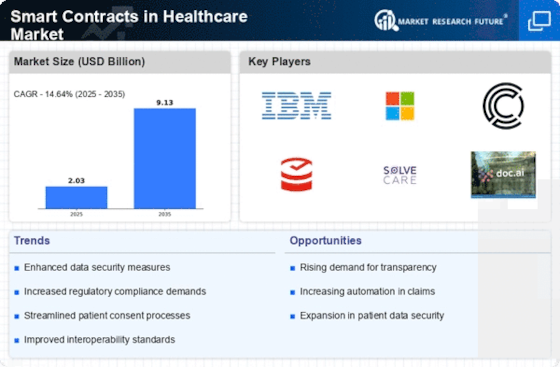-
Executive Summary
-
1.1
-
Market Attractiveness Analysis
-
Global Smart Contracts
-
in Healthcare Market, by Blockchain Platform
-
Global
-
Smart Contracts in Healthcare Market, by Application
-
Global
-
Smart Contracts in Healthcare Market, by End user
-
Smart
-
Contracts in Healthcare Market, by Region
-
Scope of
-
the Report
-
Market Definition
-
Scope
-
of the Study
-
Market Structure
-
Market
-
Research Methodology
-
Research Process
-
3.2
-
Primary Research
-
Secondary Research
-
3.4
-
Market Size Estimation
-
Forecast Model
-
3.6
-
List of Assumptions
-
Market Insights
-
5
-
Industry Overview of the Global Smart Contracts in Healthcare Market
-
Introduction
-
Drivers
-
5.2.1
-
Drivers: Impact Analysis
-
Restraints
-
5.2.2
-
Restraints: Impact Analysis
-
Opportunities
-
6
-
Market Factor Analysis
-
Porter’s Five Forces
- Threat of New Entrants
- Bargaining Power
- Threat of Substitutes
-
Analysis
-
6.1.2
-
Bargaining Power of Suppliers
-
of Buyers
-
6.1.4
-
Intensity of Rivalry
-
Value Chain/Supply Chain of
-
the Global Smart Contracts in Healthcare Market
-
Global
-
Smart Contracts in Healthcare Market, by Blockchain Platform
-
7.1
-
Introduction
-
Ethereum
- Market Estimates
- Market Estimates &
-
& Forecast, 2020–2027
-
Forecast, by Region, 2020–2027
-
Bitcoin
- Market
-
7.3.1
-
Market Estimates & Forecast, 2020–2027
-
Estimates & Forecast, by Region, 2020–2027
-
NXT
- Market Estimates & Forecast, 2020–2027
-
7.4.2
-
Market Estimates & Forecast, by Region, 2020–2027
-
7.5
-
Sidechains
-
Market Estimates & Forecast,
-
Market Estimates & Forecast, by Region, 2020–2027
-
Global Smart Contracts in Healthcare Market,
-
by End user
-
Introduction
-
Pharmaceutical
- Market Estimates & Forecast, 2020–2027
-
Companies
-
8.2.2
-
Market Estimates & Forecast, by Region, 2020–2027
-
8.3
-
Healthcare Providers
-
8.4
-
Healthcare Payers
-
8.5
-
Other End Users
-
9.
-
Market Estimates & Forecast, 2020–2027
-
Market Estimates & Forecast, by Region, 2020–2027
-
Market Estimates & Forecast, 2020–2027
-
Market Estimates & Forecast, by Region, 2020–2027
-
Market Estimates & Forecast, 2020–2027
-
Market Estimates & Forecast, by Region, 2020–2027
-
Global Smart Contracts in Healthcare Market, by Application
-
Introduction
-
Patient Data Management
- Market Estimates & Forecast, 2020–2027
- Market Estimates
-
& Forecast, by Region, 2020–2027
-
Electronic
- Market Estimates & Forecast, 2020–2027
- Market Estimates & Forecast, by Region, 2020–2027
- Market Estimates & Forecast, 2020–2027
- Market Estimates & Forecast, by Region, 2020–2027
- Market Estimates &
- Market Estimates & Forecast, by Region,
-
Health Records (EHRS)
-
9.4
-
Supply Chain Management
-
9.5
-
Clinical Data Exchange and Interoperability
-
Forecast, 2020–2027
-
Claims Adjudication and Billing Management
- Market Estimates & Forecast, 2020–2027
- Market Estimates
-
& Forecast, by Region, 2020–2027
-
Others
- Market Estimates & Forecast, 2020–2027
- Market Estimates
-
& Forecast, by Region, 2020–2027
-
Global
-
Smart Contracts in Healthcare Market, by Region
-
Introduction
-
North America
- Market Estimates & Forecast,
- Market Estimates & Forecast, by Blockchain
- Market Estimates & Forecast, by Application,
- Market Estimates & Forecast, by End user, 2020–2027
- US
-
by Country, 2020–2027
-
Platform, 2020–2027
-
10.2.5.4
-
Market Estimates & Forecast, by End user, 2020–2027
-
10.2.6
-
Canada
-
10.2.6.2
-
Market Estimates & Forecast, 2020–2027
-
Market Estimates & Forecast, by Blockchain Platform, 2020–2027
-
10.2.6.3
-
Market Estimates & Forecast, by Application, 2020–2027
-
Estimates & Forecast, by End user, 2020–2027
-
Estimates & Forecast, by Blockchain Platform, 2020–2027
-
10.2.7.3
-
Market
-
Mexico
-
Market Estimates & Forecast, 2020–2027
-
Market
-
Market Estimates & Forecast, by Application, 2020–2027
-
Estimates & Forecast, by End user, 2020–2027
-
10.3.2
-
Market
-
Europe
- Market Estimates & Forecast, by Country, 2020–2027
-
Market Estimates & Forecast, by Blockchain Platform, 2020–2027
-
10.3.3
-
Market Estimates & Forecast, by Application, 2020–2027
-
Estimates & Forecast, by End user, 2020–2027
-
Estimates & Forecast, by Blockchain Platform, 2020–2027
-
10.3.5.3
-
Market
-
Germany
-
Market Estimates & Forecast, 2020–2027
-
Market
-
Market Estimates & Forecast, by Application, 2020–2027
-
Estimates & Forecast, by End user, 2020–2027
-
Estimates & Forecast, by Blockchain Platform, 2020–2027
-
10.3.6.3
-
Market
-
France
-
Market Estimates & Forecast, 2020–2027
-
Market
-
Market Estimates & Forecast, by Application, 2020–2027
-
Estimates & Forecast, by End user, 2020–2027
-
Estimates & Forecast, by Blockchain Platform, 2020–2027
-
10.3.7.3
-
Market
-
UK
-
Market Estimates & Forecast, 2020–2027
-
Market
-
Market Estimates & Forecast, by Application, 2020–2027
-
Estimates & Forecast, by End user, 2020–2027
-
of Europe
-
10.3.8.2
-
Market
-
Rest
-
Market Estimates & Forecast, 2020–2027
-
Market Estimates & Forecast, by Blockchain Platform, 2020–2027
-
10.3.8.3
-
Market Estimates & Forecast, by Application, 2020–2027
-
Estimates & Forecast, by End user, 2020–2027
-
10.4.2
-
Market
-
Asia-Pacific
- Market Estimates & Forecast, by Country, 2020–2027
-
Market Estimates & Forecast, by Blockchain Platform, 2020–2027
-
10.4.3
-
Market Estimates & Forecast, by Application, 2020–2027
-
Estimates & Forecast, by End user, 2020–2027
-
Estimates & Forecast, by Blockchain Platform, 2020–2027
-
10.4.5.3
-
Market
-
China
-
Market Estimates & Forecast, 2020–2027
-
Market
-
Market Estimates & Forecast, by Application, 2020–2027
-
Estimates & Forecast, by End user, 2020–2027
-
Estimates & Forecast, by Blockchain Platform, 2020–2027
-
10.4.6.3
-
Market
-
India
-
Market Estimates & Forecast, 2020–2027
-
Market
-
Market Estimates & Forecast, by Application, 2020–2027
-
Estimates & Forecast, by End user, 2020–2027
-
Estimates & Forecast, by Blockchain Platform, 2020–2027
-
10.4.7.3
-
Market
-
Japan
-
Market Estimates & Forecast, 2020–2027
-
Market
-
Market Estimates & Forecast, by Application, 2020–2027
-
Estimates & Forecast, by End user, 2020–2027
-
of Asia-Pacific
-
10.4.8.4
-
Market
-
Rest
-
Market Estimates & Forecast, 2020–2027
-
Market Estimates & Forecast, by Blockchain Platform, 2020–2027
-
Market Estimates & Forecast, by Application, 2020–2027
-
Market Estimates & Forecast, by End user, 2020–2027
-
10.5
-
Middle East & Africa
-
Forecast, by Blockchain Platform, 2020–2027
-
10.5.2
-
Market Estimates &
-
Market Estimates & Forecast, by Application, 2020–2027
-
10.5.3
-
Market Estimates & Forecast, by End user, 2020–2027
-
10.6
-
South America
-
Forecast, by Blockchain Platform, 2020–2027
-
10.6.2
-
Market Estimates &
-
Market Estimates & Forecast, by Application, 2020–2027
-
10.6.3
-
Market Estimates & Forecast, by End user, 2020–2027
-
11.
-
Company Landscape
-
Competitive Overview
-
11.2
-
Competitor Dashboard
-
Major Growth Strategies in
-
the Global Smart Contracts in Healthcare Market
-
Competitive
-
Benchmarking
-
Vendor Share Analysis
-
11.6
-
XXXX: The leading player in terms of number of developments in the Global
-
Smart Contracts in Healthcare Market
-
Key Developments
- Product Launches/Service Deployment
- Mergers & Acquisitions
- Joint
- Business Expansion
-
& Growth Strategies
-
Ventures
-
Company Profiles
-
IBM Corporation.
- Company
- Product/Business Segment Overview
- Key Developments
-
Overview
-
12.1.3
-
Financial Updates
-
12.1.5
-
Key Strategies
-
Patientory.
- Product/Business Segment Overview
- Financial Updates
- Key Developments
- Key Strategies
-
12.2.1
-
Company Overview
-
Factom.
- Company Overview
- Product/Business
- Financial Updates
- Key Strategies
- Company Overview
- Financial
- Key Developments
- Key
-
Segment Overview
-
12.3.4
-
Key Developments
-
12.4
-
Proof.Work.
-
12.4.2
-
Product/Business Segment Overview
-
Updates
-
Strategies
-
SimplyVital Health
- Product/Business Segment Overview
- Financial Updates
- Key Developments
- Key Strategies
-
12.5.1
-
Company Overview
-
Gem
- Product/Business Segment Overview
- Financial Updates
- Key Developments
- Key Strategies
-
12.6.1
-
Company Overview
-
PokitDok,
- Company Overview
- Product/Business
- Financial Updates
- Key Strategies
- Company Overview
- Financial
- Key Developments
- Key
-
Inc
-
Segment Overview
-
12.7.4
-
Key Developments
-
12.8
-
Hashed Health
-
12.8.2
-
Product/Business Segment Overview
-
Updates
-
Strategies
-
Chronicled
- Company
- Product/Business Segment Overview
- Key Developments
-
Overview
-
12.9.3
-
Financial Updates
-
12.9.5
-
Key Strategies
-
smartData Enterprises.
- Product/Business Segment Overview
- Financial Updates
- Key
- Key Strategies
- Company Overview
- Financial
- Key Developments
-
12.10.1
-
Company Overview
-
Developments
-
12.11
-
iSolve
-
12.11.2
-
Product/Business Segment Overview
-
Updates
-
12.11.5
-
Key Strategies
-
FarmaTrust
- Product/Business Segment Overview
- Financial Updates
- Key
- Key Strategies
- Company Overview
- Financial
- Key Developments
-
12.12.1
-
Company Overview
-
Developments
-
12.13
-
Blockpharma
-
12.13.2
-
Product/Business Segment Overview
-
Updates
-
12.13.5
-
Key Strategies
-
Microsoft Corporation
- Product/Business Segment Overview
- Financial Updates
- Key
- Key Strategies
- Company Overview
- Financial
- Key Developments
-
12.14.1
-
Company Overview
-
Developments
-
12.15
-
Guardtime
-
12.15.2
-
Product/Business Segment Overview
-
Updates
-
12.15.5
-
Key Strategies
-
Medicalchain
- Product/Business Segment Overview
- Financial Updates
- Key
- Key Strategies
-
12.16.1
-
Company Overview
-
Developments
-
LIST
-
OF TABLES
-
Global Smart Contracts in Healthcare
-
Market, by Region, 2020–2027
-
North
-
America: Smart Contracts in Healthcare Market, by Country, 2020–2027
-
Europe: Smart Contracts in Healthcare Market,
-
by Country, 2020–2027
-
Asia-Pacific:
-
Smart Contracts in Healthcare Market, by Country, 2020–2027
-
Middle East & Africa: Smart Contracts in Healthcare
-
Market, by Country, 2020–2027
-
South
-
America: Smart Contracts in Healthcare Market, by Country, 2020–2027
-
Global Smart Contracts in Healthcare Blockchain
-
Platform Market, by Region, 2020–2027
-
North
-
America: Smart Contracts in Healthcare Blockchain Platform Market, by Country,
-
Europe: Smart Contracts in
-
Healthcare Blockchain Platform Market, by Country, 2020–2027
-
Table10 Asia-Pacific: Smart Contracts in Healthcare Blockchain
-
Platform Market, by Country, 2020–2027
-
Table11 Middle
-
East & Africa: Smart Contracts in Healthcare Blockchain Platform Market,
-
by Country, 2020–2027
-
Table12 South America:
-
Smart Contracts in Healthcare Blockchain Platform Market, by Country, 2020–2027
-
Table13 Global Smart Contracts in Healthcare Application
-
Market, by Region, 2020–2027
-
Table14 North America:
-
Smart Contracts in Healthcare Application Market, by Country, 2020–2027
-
Table15 Europe: Smart Contracts in Healthcare Application
-
Market, by Country, 2020–2027
-
Table16 Asia-Pacific:
-
Smart Contracts in Healthcare Application Market, by Country, 2020–2027
-
Table17 Middle East & Africa: Smart Contracts
-
in Healthcare Application Market, by Country, 2020–2027
-
Table18
-
South America: Smart Contracts in Healthcare Application Market, by
-
Country, 2020–2027
-
Table19 Global Smart Contracts
-
in Healthcare End user Market, by Region, 2020–2027
-
Table20
-
North America: Smart Contracts in Healthcare End user Market, by Country,
-
Table21 Europe: Smart Contracts in
-
Healthcare End user Market, by Country, 2020–2027
-
Table22
-
Asia-Pacific: Smart Contracts in Healthcare End user Market, by Country,
-
Table23 Middle East & Africa:
-
Smart Contracts in Healthcare End user Market, by Country, 2020–2027
-
Table24 South America: Smart Contracts in Healthcare
-
End user Market, by Country, 2020–2027
-
LIST
-
OF FIGURES
-
Global Smart Contracts in Healthcare Market
-
Segmentation
-
Forecast Methodology
-
Porter’s Five
-
Forces Analysis of the Global Smart Contracts in Healthcare Market
-
Value Chain of the Global Smart Contracts in Healthcare Market
-
Share of the Global Smart Contracts in Healthcare Market, by Country,
-
Global Smart Contracts in Healthcare Market, 2020–2027
-
Sub-Segments of Type
-
Global Smart Contracts in Healthcare
-
Market Size, by Blockchain Platform, 2020
-
Share of the Global
-
Smart Contracts in Healthcare Market, by Blockchain Platform, 2020–2027
-
Global Smart Contracts in Healthcare Market Size, by Application,
-
Share of Global Smart Contracts in Healthcare Market,
-
by Application, 2020–2027
-
Global Smart Contracts
-
in Healthcare Market Size, by End user, 2020–2027
-
Share
-
of Global Smart Contracts in Healthcare Market, by End user 2020–2027









Leave a Comment